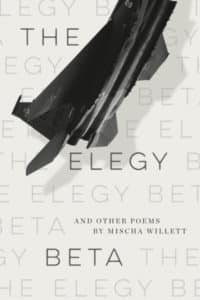
Poet Mischa Willett is exploring the elegy. More than that, he’s modernizing it.
You reach a certain age, and you begin to understand why the elegy is an enduring poetic form. Its history stretches as far back as the Greeks and Romans. Typically associated with death and funerals, an elegy can be almost any poem that’s a serious reflection. Traditional elegies (think Thomas Gray’s “Elegy Written in a Country Churchyard”) make full use of rhyming couplets. Contemporary elegies generally drop the rhyme, but they retain the concept of seriousness and solemnity.
The title poem in Willet’s new collection, The Elegy Beta, fits that contemporary understanding. Fully one third of the entire collection, it is organized in 10 sections. The subtitle of the poem is “After Rilke,” but it is more than just “after.” It is a homage to Rainer Maria Rilke’s Duino Elegies, a work of ten elegiac poems sometimes referred to as the “angel elegies.” Rilke wrote the poems between 1912 and 1923, interrupted by his service in the Austrian army in World War I.
Reading the ten elegies or sections of “The Elegy Beta” is an almost overwhelming experience. They are indeed “after Rilke” in the subject matter — engaging with faith, beauty, and suffering. Together they comprise a serious reflection on life and its meaning. “Everything is going away, and what / rushes in to replace what was once / the world is action for its own sake. / But despite all the hammering, the heart / endures, as the tongue still praises / despite the teeth.”
Even the remaining two thirds of the collection bear the influence of the idea of the elegy. With a couple of notable exceptions, the poems are serious and reflective, even when they play with language. Consider this impressionistic pastoral poem about the seasons.
Eclogue

February slant light. Morning Chill.
These northern altitudes exude aura
the deepish tilt makes grey rose rose gold
Aurora feasible borealis only here
and maybe same in the south southern
hemisphere. Who knows? Irises up
too soon, suffer for over eager
will no pollinating eager bee ever
visit. Dead, they. Right? Each winter?
All only a season old? Can it (even queen?)
be? Not for any of us more by much:
re-learn the honey—stung comb box
and waxy pattern. Also fight noise summer
scent the prick sweet pang of waiting.

Mischa Willett
Willett teaches English at Seattle Pacific University. He specializes in 19th century British poetry and also teaches Shakespeare, C.S. Lewis and the Inklings, and creative writing. He received his B.A. degree from Wheaton College, his M.A. degree from Northern Arizona University, and his M.F.A. and Ph.D. degrees from the University of Washington. His poetry and writing have been published in First Things, Books & Culture, Mere Orthodoxy, Front Porch Republic, Rio Grande Review, Saint Katherine Review, The Christian Century, and other publications.
The Elegy Beta arrives right at a time of global concern about viral plagues, unrest, and political upheaval. The timing of the collection is coincidental, but these poems by Willett remind us that the elegy is a living poetic form, needed as much now as it ever was. Perhaps even more.
Related: Mischa Willett and “Phases”
Photo by Ian Dick, Creative Commons, via Flickr. Post by Glynn Young.
__________________________

“I require all our incoming poetry students—in the MFA I direct—to buy and read this book.”
—Jeanetta Calhoun Mish
- Longfellow’s “Paul Revere’s Ride”: Creating a National Legend - April 17, 2025
- Poets and Poems: Katie Kalisz and “Flu Season” - April 15, 2025
- Poets and Poems: Michelle Ortega and “When You Ask Me, Why Paris?” - April 10, 2025
Leave a Reply